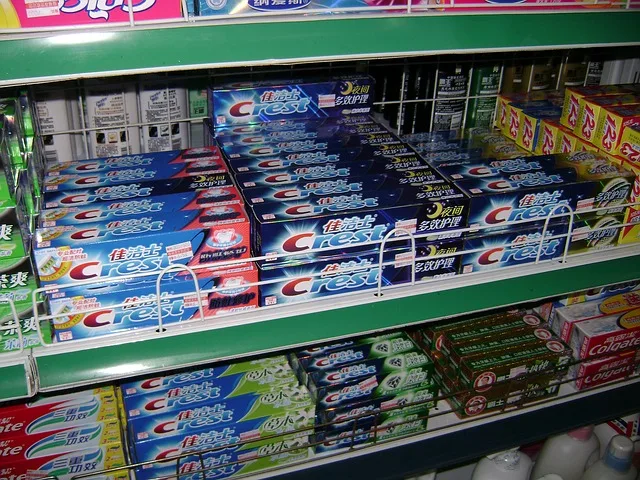“Do not swallow,” and “in case of accidental ingestion, contact the poison control center.” Your mouth is one of the most absorbent places in your entire body. While you are brushing, the ingredients enter your mouth and gums and making their way into your bloodstream.

10 Reasons to Never Use Conventional Toothpaste Again
Triclosan
Conventional toothpastes can contain Triclosan, a chemical germ killer. Triclosan is still being used as an active ingredient in Colgate Total toothpaste — and has been for nearly two decades! Triclosan was originally registered as a pesticide and is linked to cancer, disrupts thyroid hormones and affects heart function.
Polyethylene glycols
Did you know that polyethylene is the most common plastic in the world? It is used mostly for containers and packaging.
Here’s what the National Institute for Occupational Safety and Health has to say about PEG:
“Ethylene glycol is chemically broken down in the body into toxic compounds. It and its toxic byproducts first affect the central nervous system (CNS), then the heart, and finally the kidneys. Ingestion of sufficient amounts can be fatal.”
Fluoride
Fluoridated toothpaste damages gums. At the concentrations used in commercial fluoridated toothpaste (1,000 ppm), fluoride causes gum damage by poisoning enzyme activity and slowing down the gums’ self-repair mechanisms. A study published in Neurologia showed that the prolonged ingestion of fluoride may cause significant damage to health and particularly to the nervous system. Fluoride can cause side effects like damage to the brain, decreased IQ in children, damage to the pineal gland, thyroid gland, bones, gastrointestinal tract, and cancers.
According to J. Lee et al. (published in Toxicology in January 2008, pp. 340–347), sodium fluoride is cytotoxic (harms/kills living cells) and produces an inflammatory response.
Surfactants
Surfactants such as sodium lauryl sulfate are readily absorbed in the body and are considered carcinogenic. They can also cause skin and eye irritations, hormone imbalances, denaturing of structural proteins, canker sores and mouth ulcers.
Sorbitol
The other name of sorbitol is ‘glucitol’. It is actually a sugar alcohol, which is slowly metabolized by the human body. Sugar alcohols are famous for causing digestive distress. According to Chris Kresser, “because sugar alcohols are FODMAPs and are largely indigestible, they can cause diarrhea by pulling excess water into the large intestine. The fermentation of sugar alcohols by gut bacteria can also cause gas and bloating, and sugar alcohols may decrease fat absorption from other foods.”
Artificial sugars
What all such sugars apparently do is lower the pH of the dental plaque (more acidity = more damage to the tooth). If you find aspartame, be aware that it is toxic and has been connected to dozens of diseases incl. brain tumors.
Propylene Glycol
Propylene glycol is an active component in antifreeze and acts as a solvent or surfactant. Did you know that the EPA considers propylene glycol to be so dangerously toxic that it must be handled with gloves, protective clothing, goggles, and proper disposal?
Glycerin
According to Dr. Gerald F. Judd’s research, you must avoid all toothpastes containing glycerin. Glycerine coats your teeth like plastic wrap blocking your teeth from absorbing nutrients and re-mineralizing. Toothpastes with glycerine “require 20 rinses to get it off” (Judd, Good Teeth, Birth to Death).
Diethanolamine
Diethanolamine (DEA) is a foaming agent that’s linked to liver and kidney cancers. DEA disrupts hormones and forms cancer-causing nitrates.
source : diyhealth.tips
